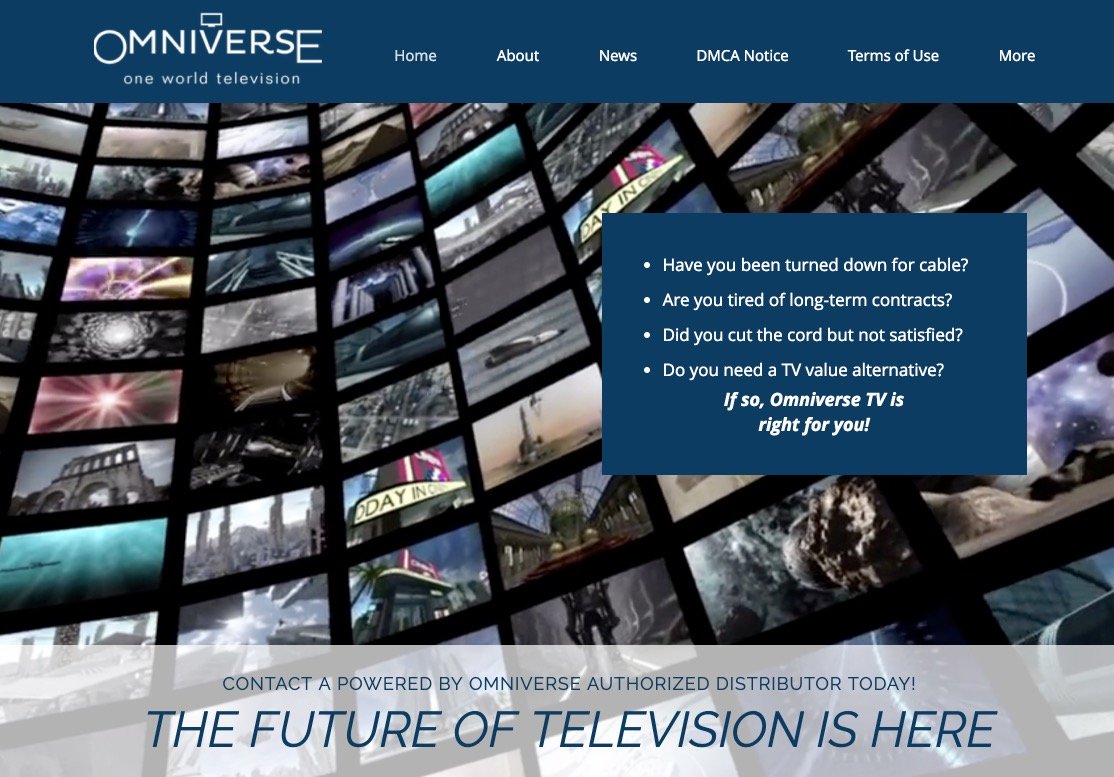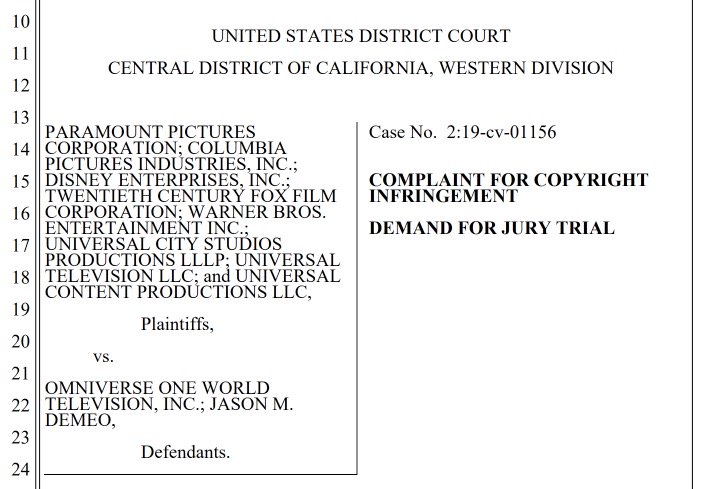Hollywood v. Ominverse One World Television Inc. — What you need to know
Hollywood is going after a streaming reseller that it says doesn't have the rights to sell streams

For as many great (and legal) streaming services that are available today, there still is a huge problem with piracy. Look no further than the more popular cord-cutting groups on Facebook, and various streaming subreddits — particularly when it comes to live sporting events — for that.
But the studios are fighting back. And on Feb. 14 a number of them filed a federal lawsuit against a reseller that they say was and is not licensed to resell their content to anyone. And it very possibly could affect how you're watching things at home.
Here's what you need to know:

Who's suing who?
The suit was filed in the Central District of California. It lists Paramount Pictures, Columbia Pictures, Disney, Twentieth Century Fox, Warner Bros. and Universal City Studios, Universal Television (think NBC), and Universal Content Productions as the plaintiffs.
They're suing Omniverse One World Television Inc. and its owner, Jason DeMeo.
What are they suing over?
To put it simply, the studios say that Ominverse One World never had permission to resell streams of its content to anyone, and that it has been unable (and unwilling) to show proof to the contrary.
In other words, copyright infringement, and intentionally inducing the infringement of copyrighted work.
Get the What to Watch Newsletter
The latest updates, reviews and unmissable series to watch and more!
And they say Omniverse isn't exactly being shy about it.
From the suit :
Defendants are not shy about their role—they brazenly brand their growing network of infringing services as being "Powered by Omniverse."
This slogan advertises Omniverse as an easy source for content and attracts more unauthorized downstream services to enter the market by advertising a ready source of infringing content.
What do the studios want?
First, they want Omniverse to stop stealing their stuff. But they also want it to pay damages. A lot of damages. (Plus attorneys' fees and court costs, of course.)
None of that should be surprising.
The scope of Defendants' infringement grows with every downstream service that Defendants entice to enter the illegal market. Those services are attracted by the opportunity to build a business through Defendants' "no strings attached" access to infringing content that they, in turn, can sell to end consumers at an unfair competitive advantage.
What does Omniverse have to say about it?
Omniverse released the following statement on Feb. 19 :
While Omniverse disagrees with the substance and the specifics of the allegations made against the company in a recent California court filing, we are highly supportive of the mission that the plaintiffs and their partners in the Alliance for Creativity and Entertainment (ACE) are carrying out. Omniverse believes there is no place in the industry for media pirates and, consistent with the plaintiffs, believes their legitimate business has been harmed by the unlicensed distribution of media content.
Consistent with our shared goals for the industry, Omniverse intends to engage quickly and constructively with the plaintiffs and their legal counsel to resolve their concerns with Omniverse's business and where possible support them in their greater goal of eliminating piracy from our industry. It is our belief that when this process is complete, that both sides will be satisfied with the outcome.
What services use Omniverse to power their channels?
Here's where things start to involve us as customers. The studios name a bunch of other companies as customers of Omniverse. They're not listed as defendants, just as examples of companies that Omniverse sold infringing streams to.
The three named in the lawsuit are SkyStream TV, Flixon TV, and HDHomerun Premium, which is owned by SiliconDust. (For sure there are others out there that use Omniverse a provider, though.)
The latter is the most well-known of the bunch, of course. We covered HDHomerun Premium when it quietly launched in beta on a Friday night in August 2018 . There certainly wasn't any reason at the time for customers to worry about the legitimacy of the service, though some insiders (including the venerable Dave Zatz ) apparently wondered otherwise. (And this shouldn't affect HDHomerun's over-the-air hardware in any way.)

The resellers respond
We reached out to those three companies — HDHomerun (which is owned by SiliconDust), SkyStream and Flixon.
SiliconDust CEO Theodore Head replied within minutes and noted that they're looking at how to keep paying customers from being impacted, and whether there will be any change to HDHomerun Premium.
"Yes we are aware of the situation from last week," he wrote by e-mail. "SiliconDust is not a party of the lawsuit, but we can be indirectly affected by Omniverse not able to continue their service and so we are in the process of finding out a way to best mitigate any potential interruptions to our service and will let our customers know as soon as we know if there will be any change to the current services."
HDHomerun Premium — still "streaming in cooperation with Omniverse One World Television Inc." — is still available for $35 a month. Though as we noted back in December 2018, it's already lost eight channels and has been issuing credits.
Flixon TV Marketplace Manager Steve Dutton didn't say what it was going to do, but that "We are acting swiftly and it is our belief that all parties will be satisfied with the outcome."

SkyStream didn't reply to an email (we'll update if and when they do), but it's been pretty thirsty for affiliated promotion and YouTube videos. I received eight emails from them in October and November of 2018. Something about it just didn't feel right, so we didn't touch it. Not that there's anything wrong with affiliate models and paid promotion, but something just seemed a little off.
There are, however, a handful of YouTube "reviews" of the SkyStream service .
I've been using one of those services — are the feds gonna come get me?
No. At least not for that.
In this case, at worst you'll most likely only be guilty of paying good money in good faith to a third-party that apparently hooked up with a company that apparently wasn't.











